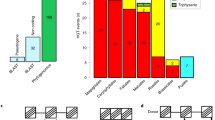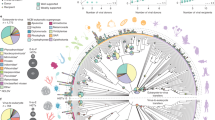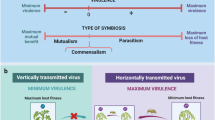Abstract
Plant mitochondrial genes are transmitted horizontally across mating barriers with surprising frequency, but the mechanism of transfer is unclear1,2. Here we describe two new cases of horizontal gene transfer, from parasitic flowering plants to their host flowering plants, and present phylogenetic and biogeographic evidence that this occurred as a result of direct physical contact between the two. Our findings complement the discovery that genes can be transferred in the opposite direction, from host to parasite plant3.
This is a preview of subscription content, access via your institution
Access options
Subscribe to this journal
Receive 51 print issues and online access
$199.00 per year
only $3.90 per issue
Buy this article
- Purchase on Springer Link
- Instant access to full article PDF
Prices may be subject to local taxes which are calculated during checkout


B. RICE
Similar content being viewed by others
References
Bergthorsson, U., Adams, K. L., Thomason, B. & Palmer, J. D. Nature 424, 197–201 (2003).
Won, H. & Renner, S. S. Proc. Natl Acad. Sci. USA 100, 10824–10829 (2003).
Davis, C. C. & Wurdack, K. J. Science 305, 676–678 (2004).
Rønsted, N., Chase, M. W., Albach, D. C. & Bello, M. A. Bot. J. Linn. Soc. 139, 323–338 (2002).
Yuncker, T. G. Mem. Torrey Bot. Club 18, 111–331 (1932).
Tessene, M. F. Mich. Bot. 8, 72–104 (1969).
Molau, U. Opera Bot. 102, 1–99 (1990).
Luteyn, J. Páramos: A Checklist of Plant Diversity, Geographical Distribution, and Botanical Literature (New York Botanical Garden Press, Bronx, New York, 1999).
Hosford, R. M. Bot. Rev. 33, 387–406 (1967).
Marcone, C., Hergenhahn, F., Ragozzino, A. & Seemüller, E. J. Phytopathol. 147, 187–192 (1999).
Haupt, S., Oparka, K. J., Sauer, N. & Neumann, S. J. Exp. Bot. 52, 173–177 (2001).
Nickrent, D. L. et al. in Molecular Systematics of Plants II (eds Soltis, D. E., Soltis, P. S. & Doyle, J. J.) 211–241 (Kluwer, Boston, 1998).
Author information
Authors and Affiliations
Corresponding author
Ethics declarations
Competing interests
The authors declare no competing financial interests.
Supplementary information
Supplementary Methods
This file contains three sections of methodology: molecular analyses, phylogenetic analyses, and ruling out DNA contamination or misidentification. Supplementary references are also included. (DOC 41 kb)
Supplementary Figure 1
This figure presents an expanded atp1 phylogeny that includes additional taxa from the Plantaginaceae, Orobanchaceae, and Convolvulaceae. (PDF 76 kb)
Rights and permissions
About this article
Cite this article
Mower, J., Stefanović, S., Young, G. et al. Gene transfer from parasitic to host plants. Nature 432, 165–166 (2004). https://doi.org/10.1038/432165b
Published:
Issue Date:
DOI: https://doi.org/10.1038/432165b
This article is cited by
-
Rickettsial DNA and a trans-splicing rRNA group I intron in the unorthodox mitogenome of the fern Haplopteris ensiformis
Communications Biology (2023)
-
Molecular mechanisms of adaptive evolution in wild animals and plants
Science China Life Sciences (2023)
-
Mitochondrial genomes of two parasitic Cuscuta species lack clear evidence of horizontal gene transfer and retain unusually fragmented ccmFC genes
BMC Genomics (2021)
-
Multichromosomal structure and foreign tracts in the Ombrophytum subterraneum (Balanophoraceae) mitochondrial genome
Plant Molecular Biology (2020)
-
Non-coding RNAs and transposable elements in plant genomes: emergence, regulatory mechanisms and roles in plant development and stress responses
Planta (2019)
Comments
By submitting a comment you agree to abide by our Terms and Community Guidelines. If you find something abusive or that does not comply with our terms or guidelines please flag it as inappropriate.



